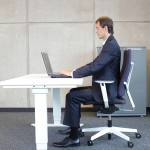 Sitting Well
Sitting Well
We all sit; albeit some more than others. It is how we sit, though, that can get us in to trouble physically.
Whether you “sit for a living” or merely sit as an alternative option to standing on and off throughout your day, improper sitting “technique” can be the cause of some significant back pain and disc degeneration over time.
Now I realize that sitting is not an Olympic event or a professional sport—though many professions require it of us. Yet, with the amount of time we spend in this posture, wouldn’t it be great if our sitting was a form of rest for our bodies, rather than injury?
Here are a few simple aspects of sitting that I regularly find myself educating my patients on:
1) Sitting should not be a multi-hour marathon. Take standing/walking around breaks every 30 minutes if possible.
2) Always sit with your feet supported—either on the floor or on an ottoman/stool. Foot support significantly decreases the pressure within your spinal discs.
3) Sit with your back supported. Unsupported sitting, such as on a stool or a bench, also significantly increases spinal disc pressure.
4) Your back should be propped in a straightened position (not slumped). If you have a disc problem, then bias your posture towards an arched/extended low back support. If you have lumbar stenosis, then bias towards a bit of a slouched/flexed low back position.
5) When sitting down aim for the front of the seat with your bottom and use controlled knee bending to land your bottom—don’t just back your legs up to the chair/couch and drop, in a free fall, onto your supporting surface. Once you have “touched down” in a controlled manner, you can scoot back all the way
6) Finally, when rising, scoot your bottom to the front of your seat cushion, stagger your legs a bit, lean your trunk forward over your thighs and push to standing via concentrated LEG EFFORT. Don’t push yourself up to standing with your arms or lift yourself with a big, heave-ho of your back muscles.